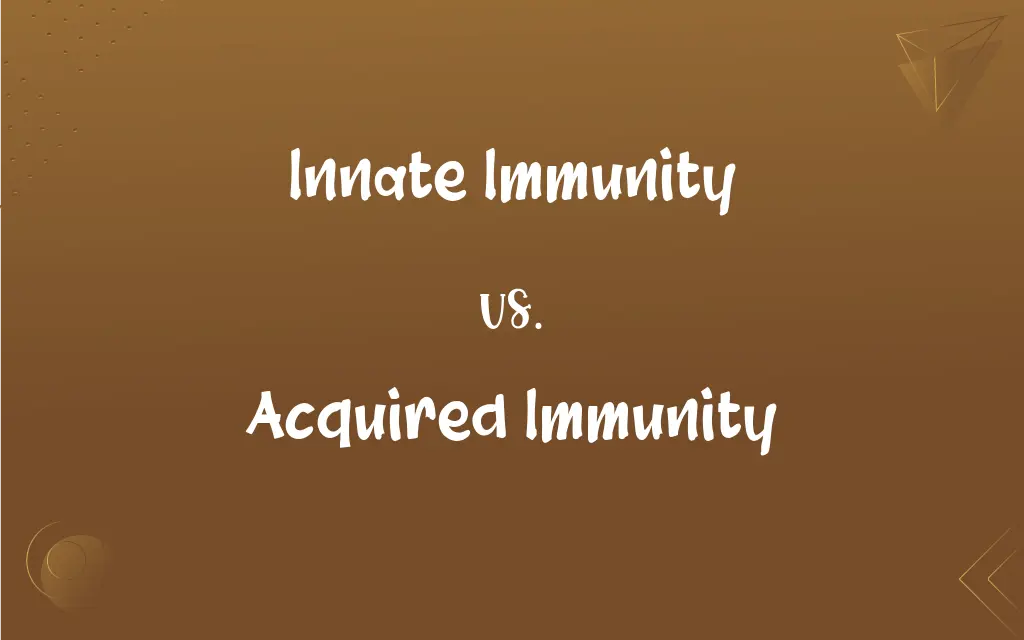Innate Immunity vs. Acquired Immunity: What's the Difference?
Edited by Harlon Moss || By Janet White || Published on July 18, 2024
Innate immunity is the body's first line of defense against pathogens, present from birth. Acquired immunity develops after exposure to specific pathogens.

Key Differences
Innate immunity refers to the non-specific defense mechanisms that come into play immediately or within hours of an antigen's appearance in the body. These mechanisms include physical barriers like the skin, as well as immune system cells like natural killer cells and macrophages. Acquired immunity, on the other hand, is specific and mediated by lymphocytes (B cells and T cells), developing as a response to exposure to pathogens. It provides long-lasting protection and memory against future attacks by the same pathogen.
Innate immunity acts quickly against a wide range of pathogens without prior exposure, its responses are not as powerful as those of acquired immunity, which takes days to develop but can target specific invaders with high precision. Innate immunity includes components like the complement system that marks pathogens for destruction, whereas acquired immunity involves the production of antibodies that neutralize or destroy pathogens.
Innate immunity does not improve with repeated exposure to a given pathogen, showcasing a static response level. In contrast, acquired immunity becomes more efficient with each exposure to a specific pathogen due to the memory cells that remember past infections. This distinction is crucial in the development of vaccines, which rely on acquired immunity to provide long-term protection against diseases.
The effectiveness of innate immunity is immediate, offering a broad defense without the need for recognition of specific antigens. Acquired immunity's effectiveness, however, is based on its ability to recognize and remember specific pathogens, leading to a stronger and faster response upon re-exposure. This memory component is absent in innate immunity, which treats each infection as if it were the first.
Innate and acquired immunity are integral parts of the immune system, working together to protect the body from infection. While innate immunity provides a constant, immediate defense against infection, acquired immunity builds a targeted, adaptive response, ensuring a tailored defense against specific pathogens. Understanding the roles and interactions of these two immune systems is essential for comprehending the body's overall defense strategy against infectious diseases.
ADVERTISEMENT
Comparison Chart
Response Time
Immediate to few hours
Days to weeks
Specificity
Non-specific
Highly specific
Memory
Lacks memory; response is the same on each exposure
Has memory; response improves on each exposure
Components
Physical barriers, phagocytes, natural killer cells
Lymphocytes (B cells and T cells), antibodies
Mechanism of Action
General defense against pathogens
Tailored defense against specific pathogens
ADVERTISEMENT
Innate Immunity and Acquired Immunity Definitions
Innate Immunity
Involves cells like macrophages.
Macrophages engulf and digest pathogens.
Acquired Immunity
Adapts and improves over time.
Repeated exposure to an antigen strengthens the immune response.
Innate Immunity
Provides broad protection.
Mucous membranes trap microbes entering the respiratory tract.
Acquired Immunity
Involves memory cells.
Memory B cells facilitate a rapid response upon re-infection.
Innate Immunity
Includes the complement system.
The complement system marks bacteria for destruction.
Acquired Immunity
Can be passive or active.
Newborns receive passive immunity through breast milk.
Innate Immunity
Immediate defense system from birth.
The skin acts as a barrier to pathogens.
Acquired Immunity
Develops after exposure to pathogens.
Vaccination triggers an adaptive immune response.
Innate Immunity
Does not adapt or improve over time.
Innate immune responses are consistent regardless of pathogen exposure frequency.
Acquired Immunity
Produces specific antibodies.
Antibodies neutralize a previously encountered virus.
FAQs
Can innate immunity remember pathogens?
No, innate immunity lacks the memory feature that is characteristic of acquired immunity.
How does innate immunity work?
It works through physical barriers, phagocytic cells, and the complement system to quickly counteract pathogens.
How does acquired immunity work?
It involves the production of specific antibodies and memory cells that recognize and target specific pathogens.
Is acquired immunity immediate?
No, it takes days to weeks to develop after exposure to a specific antigen.
What are examples of acquired immunity?
The production of antibodies by B cells and the activation of T cells specific to the pathogen are examples.
What is innate immunity?
Innate immunity is the body's first line of defense, present at birth, providing non-specific protection against pathogens.
How are innate and acquired immunity related?
They work together to provide comprehensive protection against pathogens, with innate immunity acting first and acquired immunity providing a more specific, longer-lasting defense.
What role do vaccines play in immunity?
Vaccines stimulate acquired immunity by exposing the immune system to a harmless form of a pathogen, building memory.
What is acquired immunity?
Acquired immunity is a specific defense that develops after exposure to a pathogen, providing long-lasting protection.
Can stress affect immunity?
Yes, stress can impact both innate and acquired immunity by altering immune responses.
What are examples of innate immunity?
Skin, mucous membranes, and natural killer cells are examples of innate immune mechanisms.
How long does acquired immunity last?
Acquired immunity can last for years or even a lifetime, depending on the pathogen and response.
Is acquired immunity the same as adaptive immunity?
Yes, acquired immunity is also known as adaptive immunity, highlighting its ability to adapt to specific pathogens.
How do newborns get immunity?
Newborns receive innate immunity naturally and can acquire passive immunity through maternal antibodies.
Why is acquired immunity specific?
It's specific because it targets specific antigens with antibodies and T cells tailored to those antigens.
Can innate immunity ever become specific?
Innate immunity remains non-specific; it does not adapt to target specific pathogens.
Can innate immunity be boosted?
While innate immunity is constant, overall immune health can be supported through nutrition, exercise, and sleep.
Do antibiotics affect innate or acquired immunity?
Antibiotics target bacteria and do not directly affect either innate or acquired immunity.
What is the difference between active and passive acquired immunity?
Active acquired immunity results from exposure to a pathogen or vaccination, while passive immunity is transferred from another source, like maternal antibodies.
What triggers the development of acquired immunity?
Exposure to a specific pathogen or vaccination triggers the development of acquired immunity.
About Author
Written by
Janet WhiteJanet White has been an esteemed writer and blogger for Difference Wiki. Holding a Master's degree in Science and Medical Journalism from the prestigious Boston University, she has consistently demonstrated her expertise and passion for her field. When she's not immersed in her work, Janet relishes her time exercising, delving into a good book, and cherishing moments with friends and family.
Edited by
Harlon MossHarlon is a seasoned quality moderator and accomplished content writer for Difference Wiki. An alumnus of the prestigious University of California, he earned his degree in Computer Science. Leveraging his academic background, Harlon brings a meticulous and informed perspective to his work, ensuring content accuracy and excellence.






































































